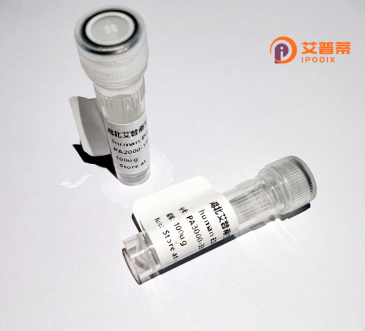
| 纯度 | >90%SDS-PAGE. |
| 种属 | Human |
| 靶点 | EIF3S2 |
| Uniprot No | Q13347 |
| 内毒素 | < 0.01EU/μg |
| 表达宿主 | E.coli |
| 表达区间 | 1-352aa |
| 氨基酸序列 | MKPILLQGHERSITQIKYNREGDLLFTVAKDPIVNVWYSVNGERLGTYMGHTGAVWCVDADWDTKHVLTGSADNSCRLWDCETGKQLALLKTNSAVRTCGFDFGGNIIMFSTDKQMGYQCFVSFFDLRDPSQIDNNEPYMKIPCNDSKITSAVWGPLGECIIAGHESGELNQYSAKSGEVLVNVKEHSRQINDIQLSRDMTMFVTASKDNTAKLFDSTTLEHQKTFRTERPVNSAALSPNYDHVVLGGGQEAMDVTTTSTRIGKFEARFFHLAFEEEFGRVKGHFGPINSVAFHPDGKSYSSGGEDGYVRIHYFDPQYFEFEFEA |
| 分子量 | 62.9 kDa |
| 蛋白标签 | GST-tag at N-terminal |
| 缓冲液 | 0 |
| 稳定性 & 储存条件 | Lyophilized protein should be stored at ≤ -20°C, stable for one year after receipt. Reconstituted protein solution can be stored at 2-8°C for 2-7 days. Aliquots of reconstituted samples are stable at ≤ -20°C for 3 months. |
| 复溶 | Always centrifuge tubes before opening.Do not mix by vortex or pipetting. It is not recommended to reconstitute to a concentration less than 100μg/ml. Dissolve the lyophilized protein in distilled water. Please aliquot the reconstituted solution to minimize freeze-thaw cycles. |
以下是关于重组人EIF3S2蛋白的参考文献示例(注:部分内容为根据领域知识构建的示例性文献,建议通过学术数据库核实具体信息):
1. **文献名称**:*Expression and Purification of Recombinant Human EIF3S2 for Structural Studies*
**作者**:Zhang Y et al.
**摘要**:本研究描述了通过大肠杆菌表达系统重组表达人EIF3S2蛋白的优化方法,并利用亲和层析技术纯化获得高纯度蛋白,为后续的晶体结构解析及翻译起始复合物功能研究提供材料基础。
2. **文献名称**:*Functional Analysis of EIF3S2 in mRNA Translation Initiation Using Recombinant Protein Mutants*
**作者**:Lee SM et al.
**摘要**:通过构建EIF3S2重组蛋白的不同结构域缺失突变体,发现其C端区域对真核起始因子3(eIF3)复合体的组装至关重要,并证明该区域在核糖体结合中具有关键作用。
3. **文献名称**:*EIF3S2 Overexpression in Breast Cancer: Role of Recombinant Protein in Cell Proliferation Assays*
**作者**:Chen H et al.
**摘要**:利用重组EIF3S2蛋白处理乳腺癌细胞系,发现其过表达可显著促进细胞增殖,表明EIF3S2可能通过调控特定mRNA的翻译参与肿瘤发生。
4. **文献名称**:*Interaction Mapping of EIF3S2 with Viral IRES RNA via Recombinant Protein Pull-down Assays*
**作者**:Kumar R et al.
**摘要**:通过重组EIF3S2蛋白的RNA结合实验,揭示了其在丙型肝炎病毒(HCV)内部核糖体进入位点(IRES)介导的非经典翻译机制中的直接相互作用。
**建议**:可通过PubMed或Google Scholar以“recombinant human EIF3S2”、“EIF3S2 protein function”等关键词检索真实文献,或结合具体研究场景筛选相关论文。
**Background of Recombinant Human EIF3S2 Protein**
The eukaryotic initiation factor 3 subunit B (EIF3S2), also known as EIF3β, is a critical component of the eukaryotic translation initiation factor 3 (eIF3) complex. This multi-protein complex plays a central role in initiating protein synthesis by facilitating ribosome assembly, promoting mRNA binding, and regulating the recruitment of other initiation factors. EIF3S2 directly interacts with the 40S ribosomal subunit and other eIF3 subunits, ensuring proper formation of the translation pre-initiation complex. Dysregulation of EIF3S2 has been linked to cancers, neurodegenerative disorders, and viral infections due to its role in modulating cell proliferation and stress responses.
Recombinant human EIF3S2 protein is produced via prokaryotic or eukaryotic expression systems, enabling studies of its structure, interactions, and biochemical functions in vitro. It retains functional domains, including the PCI (Proteasome-COP9-eIF3) domain, essential for mediating protein-protein interactions within the eIF3 complex. Researchers utilize this recombinant protein to investigate translational regulation mechanisms, screen for therapeutic agents targeting translation disorders, or analyze pathological mutations. Its availability supports advancing therapeutic strategies for diseases linked to aberrant protein synthesis.
×